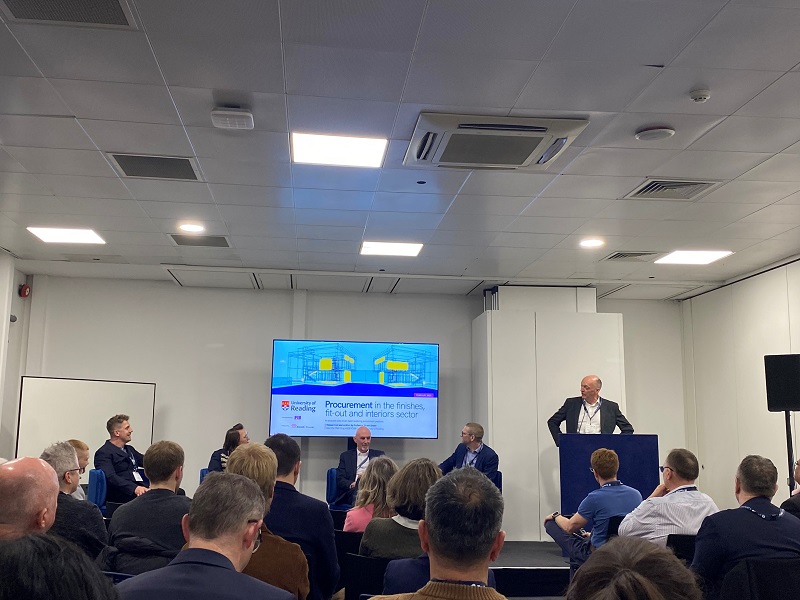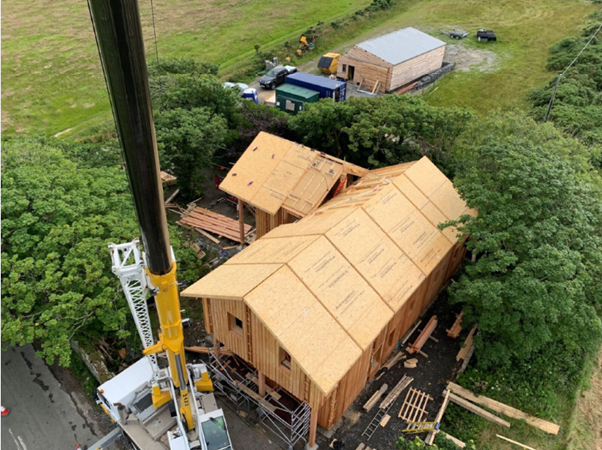The University of Reading, Finishes and Interiors Sector (FIS) and AMA Research (part of Barbour ABI) have launched a new report Procurement in the Finishes, Fit-Out and Interiors Sector, aiming to better understand how procurement practices are affecting the £10 billion fit-out industry and most importantly, how they can be improved.
FIS last year raised concerns that the push for modern methods of construction was being undermined by lack of focus on modern methods of procurement.
To better understand the evolution of procurement practices, the organisation commissioned Professor Stuart Green of the University of Reading to explore procurement practices in the UK fit-out sector.
FIS has a close working relationship with AMA Research, who were also keen to explore this topic and support this work and were able to offer assistance in developing the survey and extending the reach for participation.

The result is a fascinating new report that benchmarks current practices from those contractors directly involved and explores how procurement impacts effective delivery. Through better understanding of the challenges facing the industry, the sector can deliver better value and improve supply chain relationships.
The nature of the procurement process is often identified as a barrier to change. Dame Judith Hackitt’s statement from the 2018 ‘Building a Safer Future’ Report, confirmed that ‘Improving the procurement process will play a large part in setting the tone for any construction project. This is where the drive for quality and good outcomes, rather than lowest costs must start.’
FIS Chief Executive Iain Mcllwee stated: “The key to unlocking the potential of construction and unleashing the culture change that we need in the finishes and interiors sector sits squarely in procurement. That isn’t a revelation. Virtually every report written about the construction process has raised concerns about procurement practices that facilitate a race to the bottom and create adversarial relationships and it crops up in almost every conversation I have about improving the sector. This is felt most acutely in our sector which absolutely sits at the whip end of construction when programmes and budgets are stretched or there is huge pressure to get the work done to leverage the value of a building.”
This new report furnishes the ongoing debate with concrete data and provides a voice to those who work in the fit-out sector. It is based on both a questionnaire conducted online during July and August 2022 that returned 269 responses with 100% quality rating on results and then supplemented with 20 in-depth interviews with selected practitioners representing contractors operating at all tiers of the supply chain. The research raised serious questions about time allocation in procurement and tendering processes, and worryingly how risks are routinely pushed down the supply chain.
Professor Stuart Green, School of Construction Management and Engineering at the University of Reading said: “I have been hugely impressed with the leading-edge firms in the fit-out and interiors sector. They are crucially focused on delivering high-quality work to demanding deadlines. Such firms act as exemplars for collaborative working at its very best.
“But many firms within the sector don’t get the chance to work collaboratively. This is especially true of the smaller firms who act as subcontractors. Procurement practices are too often focused on low-cost tendering with little consideration of other factors. Subcontractors are further obliged to accept highly onerous conditions of contract which undermine trust from the outset. The smaller firms are frequently pressurised to reduce their tender price retrospectively and to offer discounts in return for prompt payment. It seems that old-fashioned subbie bashing is alive and well in the fit-out sector. This cannot be the basis upon which to sustain a modern industry.”
Laura Pardoe, Director at AMA Research said ‘Connecting with people working directly in the field helps understand the real issues they are dealing with daily. This is critical to being able to decipher what needs improving. It has been a pleasure to support FIS in reaching out to people across their sector to canvass views and gather thoughts and experiences. The objective perspective we can bring as an expert researcher provides robustness to our understanding across the array of issues uncovered.’
In conclusion, Iain Mcllwee said: “The regulatory, environmental, commercial and moral drivers for change have never been stronger and this research-based report has given a voice to all in the supply chain and is the start of a practical call to action for positive change.”
To download a copy of the report visit the link below:
https://www.thefis.org/2023/02/27/procurement-research/




















